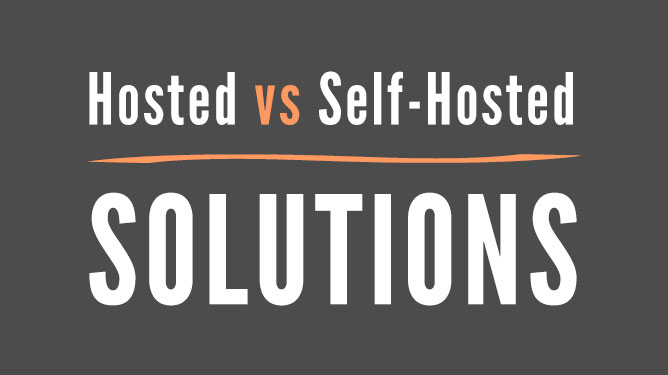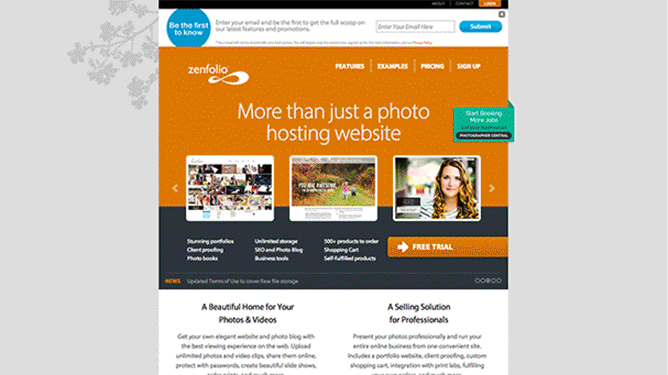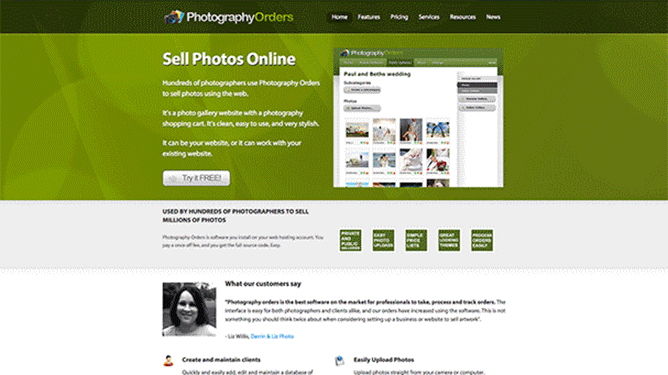The world of ecommerce can be quite daunting especially for photographers just starting out in business. As a result most photographers are left feeling overwhelmed by unanswered questions.
Without truly knowing the answers to these questions and understanding technology behind that which you are investing can make choosing the right ecommerce solution for your photography business extremely difficult.

For this reason most photographers put off making a decision and continue neglect that which could easily streamline the ordering and fulfillment of products and services.
But the fact of the matter is in today’s day and age you need an online presence, especially if you want to compete with your competitors. The ability to offer and make online transactions is crucial for systematizing your business and generating more revenue with less effort.
But unfortunately with reward also comes risks when investing in an ecommerce solution for your photography business. Each bad decision will not only affect you financially, but will also waste a tremendous amount of time and inconvenience to you, your business and your clients.
So, How Do You Make Sure That You Get Things Right In The Beginning And Avoid Unnecessary Heartache In The Future?
In this article, I’m going to give you a set of questions that you can use to first determine what are the specific requirements of your photography business and secondly, what you should look for when assessing the pros and cons of each solution that is openly available to you.
What Are The Specific Requirements Of Your Photography Business?
- Do I already have an existing website?… If so, what platform has it been built on?
- Do I currently take payments online?… If so, which payment solution do I use?
- Do I want to host transactions on my website for a seamless customer experience or do I want to host them externally on a website like paypal for example?
- How many clients do I work with each month?
- What is the average number of images I shoot and edit per job? …and how much file storage do I require per job?
- Do I have the correct internet plan which will cover the volume of images I intend on uploading to my website?
- Will my current website hosting plan support the volume of images I intend to upload and store on my website or will I need to upgrade my account or perhaps change service providers?
- Am I presently using an external printing service? …If so, which one and how well do they integrate with online ecommerce platforms?
What Questions Should You Ask When Assessing Potential Solutions?
It’s important to take your time when assessing potential candidates and I recommend that you at least have a series of questions that you can ask to assess whether or not a solution will meet or exceed the requirements of your photography business.
Here Are Seven Questions To Help You Get Started:
- How seamlessly will the solution integrate with my current website design and technology?
- Will the shopping cart integrate with my chosen payment processor and merchant account? …Or will I need to setup an account with a new payment processor or merchant account that is supported?
- Do they offer installation or setup services?
- Do they provide technical support in case you have any unforeseen issues?
- Will they upgrade my software automatically without charge or will I have to pay for future software upgrades?
- Will I be able to integrate with my email marketing provider?
- Do they integrate with external printing services?
Hosted Vs Self-Hosted Solutions
eCommerce solutions essentially fall into two specific categories “Hosted” and “Self-Hosted”, so it’s important to take into consideration the pros and cons of each before making a decision.

What Is A Hosted Solution?
“Hosted” solutions are hosted and managed entirely by the service provider and essentially all you need to do as a business owner is simply create an account, integrate with any external services and then start using the service as required.
So, What Are The Advantages Of Hosted?
No technical knowledge is generally required other than learning the how to use the applications user interface which essentially comes down to just knowing where things are located within your account.
What Are The Disadvantages Of Hosted?
Unfortunately, you have limited control over how hosted solutions operate and integrate with your business. Customizing a hosted solution can be quite difficult which can make matching designs and changing or improving usability near impossible.
But perhaps the most worrying disadvantage is that your business is built and run entirely on a platform that you don’t own. If at any stage the price of the product increases or perhaps the product is acquired by another business and moves in a direction that may not be in your best interest can be detrimental. Scenarios like these leave your photography business vulnerable and therefore you should always consider how your decisions now could affect your photography business in the future.
Examples Of Hosted Solutions For Photographers:
The following list of websites are in no particular order of importance. All offer similar features sets from online proofing through to shopping cart facilities that will meet the needs and requirements of most professional photographers.

- http://www.zenfolio.com
- http://www.shootproof.com
- http://www.smugmug.com
- http://fotomerchant.com
- http://www.instaproofs.com
- http://www.photoshelter.com
- http://www.onlinepictureproof.com
- https://redcart.com
- http://www.photobiz.com
- http://pixieset.com
What Is A Self-Hosted Solution?
“Self-Hosted” solutions are essentially installed, hosted and managed by you. A small number of software companies offer installation, setup and technical support services which for those who find technology confusing well worth the investment.
If you decide to self-host the first thing you should know is whether or not a particular solution is compatible with your web hosting server.
So, what type of code and database can run on your web server?…
This is the first question you should answer before moving forward as you may need to switch plans or perhaps move to a different web hosting company that will meet the requirements of your chosen ecommerce solution.
So, What The Advantages Of Self-Hosting?
The number one benefit associated with self-hosting is 100% control of your business asset. With control also comes the ability to customise and optimise your sales process which will lead to increased sales and overall gross profit for your business. The majority of ecommerce products on the market provide unencrypted source code which makes customising your solution achievable.
The majority of self-hosted solutions I’ve used have also offered installation and support services which can be helpful to reduce the learning curve, saving time and money in the process.
Finally there are usually no ongoing expenses with self-hosted solutions as most have a single price point with optional upgrades and support. Generally speaking, one-time payments will work in your favour especially if just starting out in business and can’t afford regular ongoing expenses.
What Are The Disadvantages Of Self-Hosting?
If you don’t have any prior knowledge or experience with regards to the inner workings of your website you will inevitably find this process extremely difficult, unless of course you intend on outsourcing or employing a staff member to manage this side of the business for you.
Not all products on the market offer installation services, so before making any commitments double check to see whether or not these services are on offer in case you require assistance installing your new online proofing and ordering software.
Support and upgrades for software of this nature usually is limited to 12 months, therefore if you wish to continue to receive these services after this initial purchase period has expired you will need to include these additional costs as part of your ongoing business expenses.
Customisation can also be difficult when hosting your own shopping cart, especially if you don’t know what you are doing and aren’t familiar with web development or the programming language and platform which your software is built upon.
Examples Of Self-Hosted Solutions For Photographers:
The following list of websites are in no particular order of importance. All offer similar features sets from online proofing through to shopping cart facilities that will meet the needs and requirements of most professional photographers.

- http://www.photographyorders.com
- http://www.ktools.net/photostore/
- http://www.picturespro.com/photo-cart/
- http://wordpress.org/plugins/image-store/
- http://www.sunshinephotocart.com
- http://www.proofbuddy.com
- https://redcart.com
So as you can see each option has it’s own advantages and disadvantages, which one you choose is entirely up to you and the requirements of your photography business.
What If My Clients Or Their Friends Steal My Images And Don’t Pay?
Unfortunately the reality is if you upload images to the internet your images will be stolen, copied and shared without your permission, yet with all that said you shouldn’t worry because people who steal images are in the minority and not the majority. You should focus more on how an online proofing/shopping cart solution will increase sales, revenue and profit because this is the sole reason why you are in business to begin with, am I correct?
In this article you’ve learnt the difference between hosted and self-hosted ecommerce solutions, why it’s important to offer clients the option of ordering online and finally what information you need on hand to choose the right ecommerce solution for your business.
Choosing an online proofing and shopping cart solution for your photography business isn’t simple or straightforward, but I believe the rewards of owning one far out way the initial selection and installation process.
So, which online proofing and shopping cart solution do you use?














What about Picz? https://piczland.com
PIcz allow you turn your dropbox folders in proof albums. It’s free and fully integrated with dropbox.
Thank you Rael
I’m looking to replace zenfolio. I want the flexibility and price of a self-host site. Did you consider Photocrati / NextGEN or The Turning Gate CE4? The latter uses Lightroom the build the site with the LR Web Module; very clever. Many of us use LR and it looks very effective. Thanks.
Thank you for your feedback Jim, I really appreciate it. I have used Photocrati / NextGEN but found it to be poorly build when it comes to optimising WordPress installations for speed. I haven’t really considered Turning Gate CE4 because it seems like a bandaid solution that is very restrictive especially if you want to apply advanced marketing tactics. I hope you enjoy the rest of your day 🙂
Annabella, great stuff the only thing is you forgot one of the systems that that started this whole selling photos online morephotos.com (1997 plus total redo in 2015) and is the most advanced system for photographers world wide. Because it’s all about selling what you want and how you want to sell it, with no rules. With the system we designed, you can sell anything and the photographer controls everything money, printing, products. And we have live tech support.
Thank you for your advice Michael, I had originally looked at “More Photos” when doing research for this article, but I wasn’t overly impressed and therefore I didn’t include your website. However, I’m happy to take another look…
Annabella,
Did you get to take another look at http://www.morephotos.net ?
This link will give you a good idea of all the different ways photographers can set up their photo cart – Plus the different kinds of products that can be offered – the system can handle any package, shape, size period. https://demolabimages.com/OrderOnline
Thank you Michael, I’ll be sure to check it out.